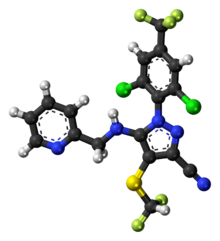Pyriprole
This article needs additional citations for verification. (October 2013) |
 | |
 | |
| Clinical data | |
|---|---|
| Trade names | Prac-tic |
| Routes of administration | Topical |
| Drug class | Ectoparasiticide |
| ATCvet code | |
| Legal status | |
| Legal status | |
| Identifiers | |
| |
| CAS Number | |
| PubChem CID | |
| ChemSpider | |
| UNII | |
| KEGG | |
| ChEBI | |
| CompTox Dashboard (EPA) | |
| Chemical and physical data | |
| Formula | C18H10Cl2F5N5S |
| Molar mass | 494.27 g·mol−1 |
| 3D model (JSmol) | |
| |
| |
| | |
Pyriprole, sold under the brand name Prac-tic, is a veterinary medication used for dogs against external parasites such as fleas and ticks.[3][4]
Pyriprole is a phenylpyrazole derivative similar to fipronil.[citation needed] Although introduced (in the 2000s) and under patent protection it is a "classic" insecticide.[citation needed][clarification needed] It is only approved in the EU and a few other countries for use on dogs.[citation needed] It is not approved for use on cats or livestock.[citation needed] It has not been introduced as an agricultural or hygiene pesticide.[citation needed]
Pyriprole applied as a spot-on is highly effective against fleas and several ticks species.[citation needed] Efficacy against fleas is comparable to that of other modern insecticidal active ingredients such as fipronil, imidacloprid or spinosad.[citation needed] As most flea spot-ons it controls existing flea and tick infestations in about 1 to 2 days, and provides about 4 weeks protection against re-infestations.[citation needed]
Mechanism of action
[edit]Pyriprole is an insecticide and acaricide. It inhibits γ-aminobutyric acid (GABA)-gated chloride channels (GABAA receptors) resulting in uncontrolled hyperactivity of the central nervous system of fleas and ticks.
Parasites are killed through contact rather than by systemic exposure. Following topical administration pyriprole is rapidly distributed in the hair coat of dogs within one day after application. It can be found in the hair coat throughout the treatment interval. Insecticidal efficacy duration against new infestations with fleas persists for a minimum of four weeks. The substance can be used as part of a treatment strategy for the control of flea allergy dermatitis (FAD).
References
[edit]- ^ "Prac-tic EPAR". European Medicines Agency (EMA). 18 December 2006. Retrieved 26 December 2024.
- ^ "Prac-tic PI". Union Register of medicinal products. 20 December 2006. Retrieved 26 December 2024.
- ^ Page SW (2008). "Antiparasitic Drugs". In Maddison JE, Page SW, Church DB (eds.). Small Animal Clinical Pharmacology (Second ed.). [Edinburgh]: Elsevier Health Sciences. pp. 198–260 (229). doi:10.1016/B978-070202858-8.50012-9. ISBN 978-0-7020-2858-8.
- ^ Londershausen M, Hansen O (2008). "Ectoparasiticides – Antagonists and Modulators of Chloride Channels". In Mehlhorn H (ed.). Encyclopedia of Parasitology (3rd ed.). Berlin: Springer Rechtswissenschaft. p. 431. ISBN 978-3-540-48994-8.
